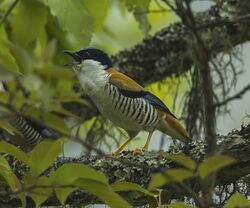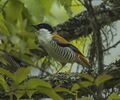Biology:Cutia
From HandWiki
Short description: Genus of birds
- The agoutis of the genus Dasyprocta are locally known as "cutias". See also Hutia, where the name for these rodents originated.
| Cutia | |
|---|---|

| |
| Himalayan cutia (Cutia nipalensis) | |
| Scientific classification | |
| Kingdom: | Animalia |
| Phylum: | Chordata |
| Class: | Aves |
| Order: | Passeriformes |
| Family: | Leiothrichidae |
| Genus: | Cutia Hodgson, 1837 |
| Type species | |
| Cutia nipalensis[1] Hodgson, 1837
| |
| Species | |
|
See text | |
The cutias are the passerine bird genus Cutia in the family Leiothrichidae. These birds are found in montane forests of continental South and Southeast Asia.[2] The name is derived from the Nepali name khatya or khutya for the type species, the Himalayan cutia (C. nipalensis).[3] The cutias are related to the alcippes and the laughingthrushes.
Species
For a long time the genus was held to be monotypic, containing only a single species C. nipalensis. This has more recently been split in two:[4]
| Image | Scientific name | Common Name | Distribution |
|---|---|---|---|
 |
Cutia nipalensis | Himalayan cutia | Himalayan region, from India to northern Thailand. |
| Cutia legalleni | Vietnamese cutia | Laos and Vietnam. |
References
- ↑ "Leiothrichidae". The Trust for Avian Systematics. https://www.aviansystematics.org/4th-edition-checklist?viewfamilies=256.
- ↑ Collar & Robson (2007)
- ↑ Pittie (2004)
- ↑ Gill, Frank; Donsker, David, eds (2018). "Laughingthrushes and allies". World Bird List Version 8.1. International Ornithologists' Union. http://www.worldbirdnames.org/bow/laughingthrushes/. Retrieved 10 June 2018.
- Collar, N.J. & Robson, Craig (2007): Family Timaliidae (Babblers). In: del Hoyo, Josep; Elliott, Andrew & Christie, D.A. (eds.): Handbook of Birds of the World, Volume 12 (Picathartes to Tits and Chickadees): 70-291. Lynx Edicions, Barcelona.
- Pittie, Aasheesh (2004): A dictionary of scientific bird names originating from the Indian region. Buceros: ENVIS Newsletter Avian Ecology & Inland Wetlands 9(2): 1-30. PDF fulltext
Wikidata ☰ Q2102604 entry
 |
